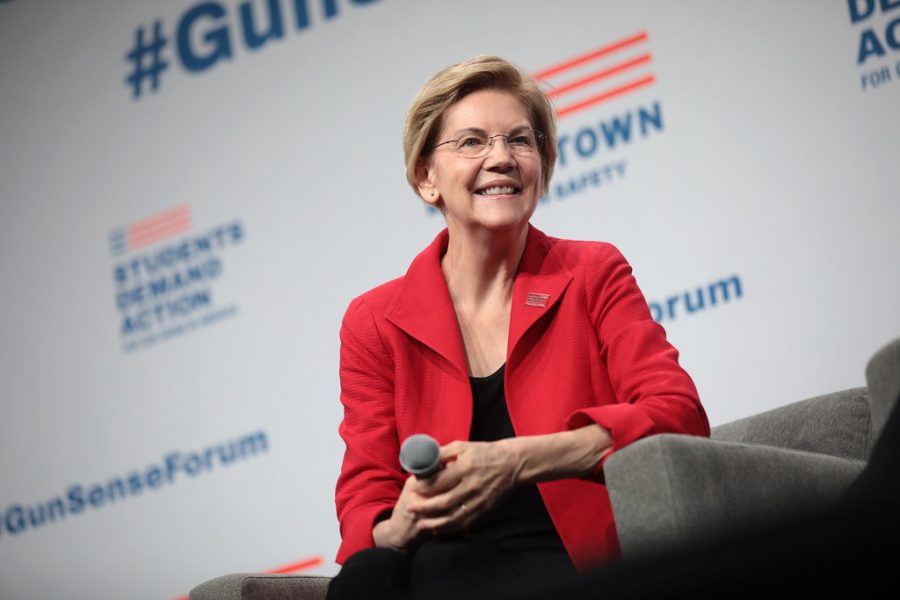Swanson: Warren Can Rally Democrats, But Can She Win it All?
November 9, 2019
Biden may still be in the 2020 presidential race, but there are two other frontrunners with a credible shot at winning the nomination — Senators Elizabeth Warren and Bernie Sanders. Warren has had a strong last couple of months and her campaign has shown consistent momentum. Most nationwide polling puts her in second place behind Biden, but recent polls from Monmouth, Quinnipiac and The Economist have put her in first. Meanwhile, Sanders experienced a dip after a heart attack, but he has since recovered with a strong performance at the October Democratic debate, endorsements from Representatives Alexandria Ocasio-Cortez and Ilhan Omar and the largest campaign rally in the 2020 cycle yet.
Voters are excited for progressive presidential candidates. As Biden’s campaign slows and the moderate candidates fail to break single digits, Warren and Sanders are on top with committed, fervent grassroots support that is shaking up the Democratic Party. The candidate who wins is the one who can electrify their base, and both Warren and Sanders have demonstrated potential to grow their respective movements. For those who wish to defeat President Trump in 2020, the question isn’t whether or not you should support Warren or Sanders — the question is, which one of the two should it be?
Warren in the Front, Sanders to the Left

Many voters see Warren as the female Sanders. There are many social issue oriented Democratic voters who were invested in electing Hillary Clinton as America’s first female president in 2016. Warren stands out as the only woman frontrunner among two older white men. These voters understand Warren is a progressive, so electing her is as good as Sanders with the added benefit of a woman president. As a progressive myself, I take issue with this superficial comparison. If Warren were elected, she would certainly be the most progressive president in modern history, but she does not approach Sanders’ commitment to progressive policy. This is clear when comparing their voting record and their positions and policy proposals regarding foreign policy, military spending, health care and wealth inequality.
Voters are also flocking to Warren due to her powerful brand. Warren has plans, many of them, and if you go to her campaign site to skim through her “Plans” page, it’s easy to see how supporters assume that. She has several posts detailing her line of action for each issue. Perhaps I’m a stickler, but I don’t see them as much more than blog posts. Sure, some have policy backing like the CARE Act for the opioid crisis, but for the most part, they are simply unusually specific political promises. While it is better than what most politicians offer, Warren pales in comparison to the multi-page policy proposals Sanders has dropped throughout his campaign.
Warren has also climbed the ranks because of her ideological positioning between the other frontrunners. While Sanders has remained rather static on his positions and his polling, Warren is soaking up voters from the Biden camp and the other candidates with ever slimming prospects. This makes the case against establishment Democrats rather than for Warren. America’s current direction is not working and small changes aren’t going to cut it anymore. Warren is the candidate with the reforms and plans to bring the change this country needs.
Warren’s Progressive Limitations
Democratic voters are faced with a difficult question — does the candidate who represents their values have what it takes to win the general election against Donald Trump? Voters with progressive values who want serious change in America will have to question some of Warren’s weaknesses in that regard. Warren has declared from the start that she supports Medicare for All and co-sponsored the bill written by Sanders, but she has shown to be rather vague on her degree of commitment. During the October Democratic debate, Mayor Pete Buttigieg asked Warren if she would support Medicare for All even if meant raising taxes on the middle class. She answered, “I will not sign a bill into law that does not lower costs for middle-class families.” Sanders was open, stating that taxes would be raised and they would cheaper than what Americans already pay insurers and doctors with premiums, co-payments and other out of pocket expenses.
Warren falls behind on other key parts of the progressive platform. In education, Warren’s plan eliminates up to $50,000 in student loan debt per student where Sanders proposes tuition-free public universities and the cancelation of all student debt. In regards to wealth inequality, Warren’s wealth tax goes into effect on households with over $50 million and taxes 3% of net worth from the billionaire class, with Sanders’ plan affects households with net worth over $32 million (the top 0.1%) and taxes 8% of net worth from households that are worth over $10 billion.
Warren’s biggest deviations from progressivism come from her stances on the military and foreign policy. Warren has been very vocal about divesting money out of the military-industrial complex, but in 2017 she voted for a military package that was larger than what Trump asked for. Sanders voted against Trump’s request both times, but Warren only did so last year. Health care, education and tax reform are all legislative feats that will require a powerful administration to manage, but foreign affairs and the military fall right under the president. A presidential candidate should be judged heavily on their defense strategy.
Warren’s Liabilities
Warren has her share of vulnerabilities and there is an underlying distaste towards the traditional politicians. Trump won Wisconsin, Michigan, Pennsylvania and a whole slew of battleground states in 2016 — states that may still prefer an “outsider.” Even New York’s 14th district rejected powerful incumbent Congressman Joe Crowley for Alexandria Ocasio-Cortez. Americans are rejecting the typical Ivy League, Rhodes Scholar, establishment politician for someone working-class with a grassroots base. This does not bode particularly well for Warren, a former Harvard professor and corporate legal advisor.
There are also her claims of Native American heritage. Warren publicly claimed that she was a descendant of the Cherokee nation until 2018. In 2018, she hoped to quell the criticism by releasing a DNA test that revealed less than 1% Native American heritage. Warren says that she was raised with stories of strong Native American ancestry, a phenomenon seen in countries with a history of colonialism like America. Descendants of settlers may idealize a single drop of native blood in their veins to absolve themselves from the sins of their fathers — a Get Out of Jail Free card for white guilt. With this in mind, Native American organizations and activists spoke out against Warren’s claims and DNA test, which she has since apologized for. Luckily for her, her Democratic primary opponents have not brought it up, but rest assured that we will be hearing about ‘Pocahontas’ in the general election, should Warren win the nomination.
Warren vs. Trump

Warren is not as progressive as Sanders, but she remains among the change-oriented candidates in the 2020 lineup. If convention comes and goes and Warren is picked to lead the Democrats in November, will she have what it takes to overcome Trump? National head-to-head polling shows that, when given the choice, Warren is consistently beating the president. A good sign, but nothing surefire (remember, Hillary Clinton lost despite winning the popular vote by three million votes).
Warren seems to edge over Trump in most of the key battleground states except Texas, where Trump polls at 49% compared to Warren’s 46.5%. Trump appears to either tie or lead by one point in Arizona. This is promising, as long as Warren keeps these leads. All her detractions aside, Warren has a relatively clean slate and a fairly good shot at winning the Democratic nomination and the presidency after that.
We have two candidates with the campaign momentum to win, and which one sees it through could very well be decided by the young voters of America. As Sanders works to differentiate his policies from Warren’s, more Warren voters will have to make a decision based on different progressive visions and they should be aware of the weaknesses her campaign brings. Dyed-in-the-wool progressives are more in line with Sanders’ reconstructive mentality over Warren’s reformative ideology, but if Warren is the nominee, the stakes will be too high for ardent Sanders voters to stay home on voting day again. Warren is a compromise between Biden and Sanders, but it cannot be denied that she could be a rallying figure for the new American left.








